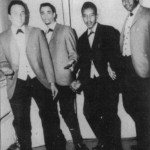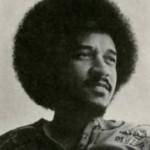By Roy Black—
One of the features of early Jamaican popular music has been the transitioning of lead vocalists of singing groups into solo singers. The phenomenon was most prevalent during the ska and rock steady eras of the 1960’s. Many went on to become international stars.
Those that come readily to mind are Bob Marley, Peter Tosh and Bunny Wailer from The Wailers group, Bob Andy and John Holt from the Paragons; Alton Ellis from Alton and the Flames; Frederick ‘Toots’ Hibbert from The Maytals; Pat Kelly from The Techniques; Harris ‘Bibi’ Seaton from The Gaylads; Brent Dowe from The Melodians; Leroy Sibbles from The Heptones; and Derrick Harriott from The Jiving Juniors.
The prospect of greater earnings has been the main driving force that has led many lead vocalists into solo singing, while differences and discrepancies between members of a few groups have caused break-ups, thereby opening doors for solo careers.

The earliest of such groups, The Jiving Juniors, were however, unique, having had two distinct phases to their existence. Additionally, and unlike the other groups, they included stints of clown acting in their performances, somewhat reminiscent of the American group The Coasters. The lead vocalist of The Jiving Juniors, Derrick Harriott, emerged as one of the most popular and outstanding figures in local and international music. He would certainly need more than one head to accommodate the many hats that he wore: A successful businessman, record producer-songwriter, recording artist, talent scout, and show promoter are a few of his hats.
In order to fully grasp the impact of Harriott’s contribution as a solo artist, one has to look at it from a wider perspective to include his years with The Jiving Juniors. The only member who sang in both phases of the group’s existence, Harriott labelled the phases ‘The Jamaican Jiving Juniors’ and ‘The New York Jiving Junior’. The genesis of the group was rooted in the duo of Sang and Harriott (Claude Sang Jr, who sang and played piano, and Derrick Harriott), students of Excelsior High School.
OVERWHELMING RESPONSE

They created quite a stir during the break and lunchtime periods as almost the entire school came to look and listen to them. Although the activity didn’t go down too well with headmaster W.A. Powell, who happened to be Harriott’s uncle, they were often included in school concerts, much to the delight of schoolmates. With an overwhelming response behind them, Harriott fancied his chances of a win at the popular Vere Johns Opportunity Hour talent show and duly entered the contest, first as a solo artist in 1955 and again in 1957 in duet with Claude Sang Jr, winning on several occasions.
Following several shows around the island and garnering the requisite exposure, Sang and Harriott went to Stanley Motta’s Recording Studios to record a demonstration disc (dub plate) of a song called Lollipop Girl in early 1956. According to Harriott, it was the first post-mento recording in Jamaica’s pop music history. Built with only handclaps, a piano, and vocals, the recording became a hot commodity after being distributed to a Maxfield Avenue-based sound system named Thunderbird as several other sound-system operators jostled to get hold of it. A re-recorded version for producer Duke Reid went to number one on the Jamaican charts in 1960.
After Sang departed on a job-related overseas course in 1958, Harriott formed The Jiving Juniors with Herman Sang (piano and vocals), Eugene Dwyer (bass), Maurice Wynter (tenor), and Harriott (lead tenor). Wynter’s clowning acts created ecstatic scenes, while Dwyer’s lyrical exchanges with Harriott drew unrestrained laughter. In 1961, the group recorded the bluesy-ska Over The River, also called I’ll Be Here When He Comes. With Harriott singing lead, it became a masterpiece, a number-one hit as well, and with little surprise as it was executed by the best musicians in the land: trombonist extraordinaire Rico Rodriguez, pianist Monty Alexander, rated the best keyboardist at the time; along with top Australian guitarist Dennis Syndrey; and an Australian drummer. The song was so special that producer Clement Dodd is said to have created a label called Supreme, especially for it. The group followed up with Answer Me My Darling and Beautiful Doll.

SEVERE BLOW
Harriott temporarily migrated to the United States at the turn of the decade (1959-1960), a move that dealt a severe blow to the group. With his departure, the Jamaican Jiving Juniors died a slow death but resurrected in New York with new members: Winston Service; Valmont Burke; and his original partner, Claude Sang Jr. The prestigious Mirasound Studios, with its sophisticated Mirasound band that recorded greats like Paul Anka, Chuck Jackson, and The Shirelles, recorded the new group between 1961 and 1962 with the hits Valerie, Come On Honey, and Don’t Leave Me. But perhaps the most popular were Don’t Treat Me Bad and Sugar Dandy, Harriott’s most enduring piece. The only Jamaican recording artist to have hits using two separate voices – falsetto and tenor – Harriott’s Sugar Dandy provided proof of the mellowness and strength of his falsetto as he sang:
“You’re mine, you’re my sugar dandy
You’re mine, you’re as sweet as candy
I love you, I need you,
You’re my only fancy
You’re mine, you’re mine,
Yes you touch my heart
You’re mine right from the start”
When the New York Jiving Juniors disbanded in 1962, Harriott went solo and unleashed a barrage of hits. He had the slow romantic pieces Close To Me, Walk the Streets, What Can I Do, My Three Loves, and I’m Only Human in which Harriott switches from falsetto to tenor with consummate ease. I Care became his first solo hit in 1962. Other hits followed: My Last Letter, Have Faith In Me, Born To Love You, Solomon, Standing In, Been So Long, and Do I Worry. He continued the musical onslaught in 1985 with Checkin’ Out and Skin to Skin. In later years, Harriott proved his ‘contemporariness’ and longevity by challenging the youth at their own game in areas such as dancehall and rapping.


You must log in to post a comment.